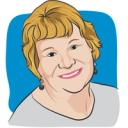
It dawned on me that even when I am going though horrible chemo, I feel better when I can be outside in the summer. I enjoy sitting in a lawn chair out in front and chatting with the neighbors.

Jane Biehl is a 12-year survivor of a very rare form of blood cancer, known as myelodysplastic syndrome (MDS). She has enjoyed several exciting careers including a librarian, counselor, teacher, and writer. She loves to write about surviving cancer, overcoming hearing loss and the wonderful benefits of having a hearing-ear service dog.

It dawned on me that even when I am going though horrible chemo, I feel better when I can be outside in the summer. I enjoy sitting in a lawn chair out in front and chatting with the neighbors.

By cancer standards, 104 months is a long time, but for me, it flew by. As my oncologist has said about all of her patients, it is never long enough. I always want to write more, do more, travel more and live life more.

Sometimes going through cancer makes a person want to scream, and sometimes, it should be OK if they do.

We stumble, we fall, we hear the cancer may have returned, we wait for tests to come back and we have rough times along the way. We need to learn to walk, whether we are limping or not.

Americans have a lot to learn. We need to embrace the importance of not always talking, but of touching. I have been so lucky.

No phase of life is totally good or bad. There is always rain.

Yes, I have a great admiration for the Olympic athletes who fall and get right back up. I know they have to wait another four years. But the cancer survivors I have met on my journey who fall and rebound are real heroes to me.

Yes, some of it is. For years before chemo, I have gone into a room and forgotten why I was there. I have never been good with names, and it has gotten worse. But chemo fog is different.

While hearing loss may not seem as major as a cancer diagnosis, patients and physicians should pay close attention to it, as it can drastically affect quality of life.

Our lives are broken up after a loss, but eventually the pieces are put back together. The hard part is that the new pieces can make a totally different picture.

We don’t need to move mountains, build a house or even clean out every closet in one day. Sometimes we just have to clean one shelf at a time, put one foot in front of the other and remind ourselves that is enough for today.

Sometimes a kind gesture can mean the world to someone going through a tough time.

I feel like the Giving Tree. I like to give, but some of my energy and ability to assist were taken away, not by a boy, but by a disease with consequences.

In the movie, Charlie Brown was asked what his New Year’s resolution was. With typical candor, he answered that instead of dreading the whole year he was dreading only one day at a time.

Cancer changed my life for the worse, but it also opened me to many new experiences I would never have had without it.

When it comes to cancer research, the Internet can be used for good or bad.

I certainly am not like some people who try to present the perfect façade of their lives, but I do not want to be a downer, either.

The famous philosopher Nietzsche once said, “He who has a why to live can bear almost any how.”

A cancer survivor talks about the importance of hope, inspired by her reading of Viktor Frankl's Man's Search for Meaning, which analyzes the psychological strength of Holocaust survivors.

One of the hardest side effects from cancer is the fatigue. This survivor explains why it is so important for cancer survivors to not overdo.

A cancer survivor describes all the wonderful people she has met on her arduous journey and what they mean to her.

A cancer survivor describes her rocky road to learning a new art form to help her heal.

Sometimes we can be regarded as being obsessed with cancer, but every single cancer survivor is more than that, and hold important roles in our lives to play.

Cancer is a serious disease, but approaching life with a lighter and happier attitude will help cancer survivors.

Cancer survivors need to be alert to side effects from chemotherapy.

Cancer survivors have to face a new normal after a diagnosis. Jane describes how her service dog taught her to accept this with grace and dignity.

Cancer survivors generally work very hard to be healthy after a diagnosis. This article gives permission to enjoy life and have a balanced attitude toward healthy living.

How one cancer survivor attempts to cope with the reality of having chemo for the rest of her life.

It is normal to feel guilt when you survived cancer and friends and family members do not. Here is one writer's way of coping.

Chemo fog, or chemo brain, is a very real phenomena that cancer survivors need to be knowledgeable about. This describes the journey of one survivor.